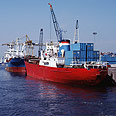
Manufacturing activity expands in local sales and exports (archives)
Photo: Jupiter
Israeli manufacturers expect a slower pace of growth in the fourth quarter as orders in Israel
and abroad have slowed, the Bank of Israel said in its third-quarter companies survey on Wednesday.
"The increase was reflected in higher domestic and export sales. Companies reported a rise in the number of their employees, and a marked and continued increase in their utilization of machinery and equipment," the survey said.
Manufacturing activity continued to expand in the July-September period in both local sales and exports, it said in the survey, which central bank chief Stanley Fischer has said holds considerable weight in monetary policy decisions.
Lowering Expectations
Central Bureau of Statistics says its new estimate based on expectations of smaller rise in exports
"They reported a slower increase in orders from the domestic market and from abroad, leading to a higher probability of a slowdown in this industry in the fourth quarter."
In response to a one-off question over whether companies expected a change in demand from the United States and Europe, most answered that they did not expect a change.
Should weak economies in the US and Europe ultimately lead to lower demand, most responded "they would increase their marketing efforts in the domestic market and abroad, with a minority stating that they would cut their production or reduce prices."
Central bank buying dollars
Business services companies reported a significant rise in third-quarter activity, due to growth in domestic sales, and expect higher orders in the final three months of 2010.
Israel's economy grew at an annualized 4.5% rate in the second quarter with growth for all of 2010 forecast at 4%.
Companies forecast an inflation rate of 2.6% over the next 12 months, unchanged from the prior survey, to stay within a government target range of 1-3%.
The Bank of Israel has raised its key short-term lending rate by 1.5 percentage points to 2% since August 2009 due to concerns of higher inflation stemming from surging housing prices.
The rate hikes, the last coming in late September, have helped to push the shekel to a two-year high versus the dollar at a rate of 3.58.
Companies expect the exchange rate to be 3.78 at the end of 2010 and 3.89 in the next 12 months. The survey was taken when the rate was 3.70.
The central bank has been buying dollars to keep the shekel from appreciating too rapidly and further damaging exports.
- Follow Ynetnews on Facebook















